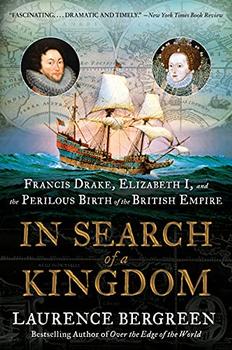Summary | Excerpt | Reviews | Beyond the Book | Readalikes | Genres & Themes | Author Bio

Francis Drake, Elizabeth I, and the Perilous Birth of the British Empire
by Laurence Bergreen
Drake did not expect to command the expedition. The original leader was Sir Richard Grenville, a wellborn mariner from Devon who had served as a member of Parliament in addition to trying his luck as a privateer. In 1574, he had proposed to rob Spanish ships, establish English colonies in South America, sail through the Strait of Magellan, and proceed across the Pacific to the Spice Islands. At the time, Drake was attempting to put down a bloody rebellion by Irish and Scots in the Rathlin Island massacre off the coast of Ireland. Hundreds died, and Drake, who had not been paid for his efforts, moved on. Grenville received his license from the English crown, but it was later withdrawn because England was reluctant to provoke the powerful, reclusive Spanish monarch, Philip II. Diplomacy, not conflict, was the watchword of the day. Drake inherited the role that had once seemed destined for Sir Richard, who resented the redheaded upstart for the rest of his life.
The Spanish had gotten a decisive jump on England in global commerce and exploration. In July 1525, just three years after Magellan's battered Victoria returned to Seville, King Charles dispatched García Jofre de Loaísa to explore the Spice Islands with a fleet of seven ships and 450 men, including Juan Sebastián Elcano, the Basque mariner who had sailed with Magellan and was among the few survivors. Loaísa was assigned to rescue lost ships from Magellan's ill-fated Armada de Moluccas, but this ambitious goal proved impossible to achieve.
After weathering storms and a mutiny, Loaísa's much reduced fleet entered the Strait in May 1526. The next leg, across the Pacific, proved devastating, as one ship after another ran aground. Santa María del Parral made it all the way to the coast of Sulawesi in Indonesia. There members of the crew were either killed or enslaved, with the exception of four survivors. Just one ship of the original seven made it to the Spice Islands. By that time, both Loaísa and Elcano had succumbed to scurvy. Their corpses were wrapped in linen and deposited in the sea. Only twenty-four men remained by the end of the voyage, and they all returned to Spain. Among them was Hans von Aachen, Magellan's gunner, who therefore became the first person to circumnavigate the globe twice.
Later, in 1533, Francisco de Ulloa was sent from Valdivia, on the coast of southern Chile, to investigate the Strait. Ulloa thus became the first European to enter the western mouth of the Strait. He made it partway through before determining he would run out of provisions and headed back to Chile. In November 1557, Juan Ladrillero became the first explorer to traverse the Strait in both directions. And he was followed by other Spanish explorers.
Their efforts raised the stakes of Drake's voyage. It was vital that Elizabeth establish an English—and Protestant—presence in the New World before it was too late. But Drake was not one to feel desperate or agitated. The sheer scale of the Central and South American landmass was too great for any power, even Spain, to control completely. Although it was not yet apparent, the Spanish navy was overextended, undisciplined, and indolent.
Yet Drake's diverse crew seemed barely equal to the ambitious tasks he set for them. Only one, William Coke, had reached the Pacific, not as an explorer but as a Spanish detainee. Drake did include men skilled in crafts they would need: a blacksmith, coopers to maintain and fashion barrels, and carpenters. Drake adored music, and he included several musicians along with a selection of instruments to perform at the change of watch and to accompany the singing of psalms.
There were about a dozen gentlemen on board, notably Thomas Doughty, a nobleman and investor in the voyage, along with his younger half brother, John, also present. Thomas Doughty probably knew of Drake's real intentions, and his status led him to think of himself as cocaptain, a dangerous delusion. The resulting insecurity unnerved Drake and affected the entire crew to the point where it would threaten the voyage.
Excerpted from In Search of a Kingdom by Laurence Bergreen. Copyright © 2021 by Laurence Bergreen. Excerpted by permission of Custom House. All rights reserved. No part of this excerpt may be reproduced or reprinted without permission in writing from the publisher.
Harvard is the storehouse of knowledge because the freshmen bring so much in and the graduates take so little out.
Click Here to find out who said this, as well as discovering other famous literary quotes!
Your guide toexceptional books
BookBrowse seeks out and recommends the best in contemporary fiction and nonfiction—books that not only engage and entertain but also deepen our understanding of ourselves and the world around us.